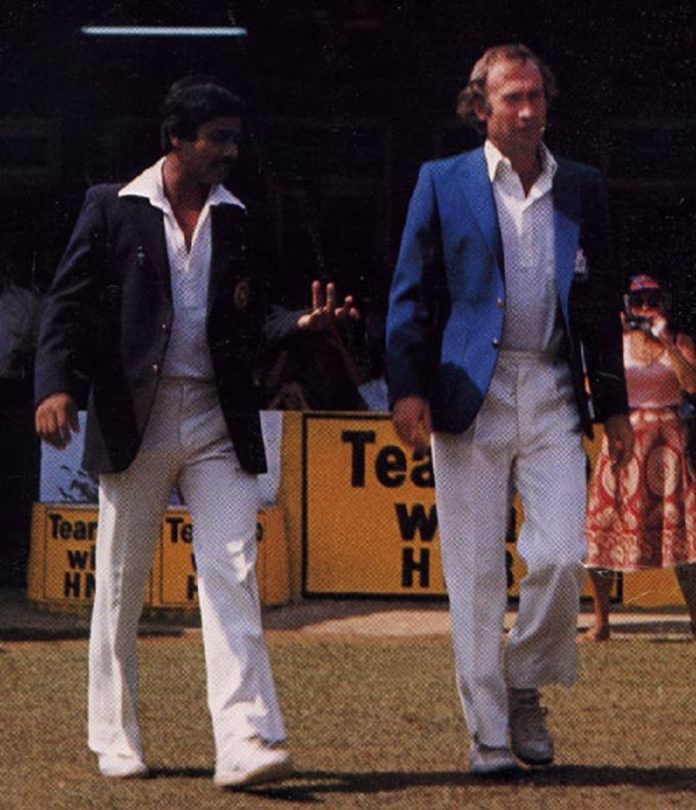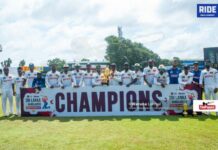A rare video clip during Sri Lanka’s ill-fated rebel cricket tour of South Africa was circulating in social media earlier this week. Many of us have read about what took place on that tour during the apartheid in South Africa, but it was the first time we saw footage of that tour.
In a nutshell, the Sri Lankans were no match for a formidable home side. The three-minute clip sums it up all with a 38-year-old Graham Pollock cleaning up Lalith Kaluperuma’s off-spin for four sixes.
For anyone who is interested in viewing the full 1983 BBC documentary, it is available on YouTube ‘Sport, South Africa and the Boycott.’ But to get a better understanding of what rebel tours did to some of the players, you have got to watch ‘Branded a Rebel’ also on YouTube.
Coming back to the point, Tony Opatha, the mastermind of the tour. is spoken to by the BBC and his comments would disappoint many, with the entire South Asian region opposed to the apartheid policies in South Africa.
“I had to feed my family. I have to give them a nice living. I am not going to please the whole world. I am going to please myself first. Charity begins at home. If you name anyone who plays the sport for fun, I would call him a liar. Today the sport is money,” Opatha was manager cum player on the tour and successfully attracted several players.
There are those who turned down the offer too. Ashantha De Mel was in England playing in the Lancashire league when he was offered a contract. Wonder why he refused, ‘Well, my parents would have kicked me out of the house,’ he says.
Sidath Wettimuny too turned down an offer. So, what were the players offered? The BBC documentary says that they were offered on average 25,000 Sterling Pounds. When they say on average 25,000 Pounds, what is meant is that the freshers, who were yet to play for Sri Lanka, received 15,000 Sterling Pounds while some others received as much as 40,000 Sterling Pounds.
The whole thing was done on the sly and that some players who were involved in a Mercantile match abandoned the game after the first day’s play and took flight to South Africa. Poor Brendon Kuruppu, just out of school, had to lead Browns Group for the rest of the game.
ශ්රී ලංකාවේ පළමු ටෙස්ට් නායකයා – බන්දුල වර්ණපුර
Sri Lanka were the first non-white side to tour apartheid South Africa. This set the stage for subsequent West Indies teams.
Most of the players who went on the tour were on the brink of retirement, but for those who had still quite a bit of cricket left in them, they thought that the Sri Lankan board would take a leaf out of England where rebels were banned from playing international cricket but were allowed to play domestic cricket. Most of these bans ended after a couple of years and players went on to successfully restart their international careers.
But to their utter surprise the board banned them from engaging in any form of cricket for 25 years. Pretty harsh sentence. To his credit, Bandula Warnapura himself turned down some young players from going on the tour because he saw what they could go onto accomplish much at the international stage. His instincts were right.
While the ban was brutal, what the players had to endure off the field was quite daunting too. Malinda Warnapura, the nephew of captain Bandula recently told ThePapare’s live chat that his parents struggled to find him admission to a primary school because of the rebel tour.
State institutions like Ceylon Electricity Board were hell bent on making life miserable for these players. But thankfully sanity prevailed, and the ban was terminated early.
Warnapura returned and held several positions in cricket both at home and with the Asian Cricket Council. He was also an excellent commentator.
Mahes Gunathilaka and Lalith Kaluperuma have served as selectors with the latter being responsible for taking the wicket keeping gloves from Sanga in Test cricket in 2006. Hemantha Devapriya has been a highly successful cricket coach while Jerry Woutersz has served several terms as Manager of the national cricket team.
For the Caribbean rebels, however, it was hard to rebuild their lives due to obvious reasons. The likes of Bob Marley and other political figures had created much awareness in the Caribbean about what was taking place in South Africa under the apartheid regime and they were never forgiven.
After all those years, you look back at South Africa and you do feel for all those lost talents because of their colour. However, equality is something that South Africa needs at this point of time as well with more and more white South Africans moving away to places like England, Australia, New Zealand and Canada. In sports, the quota system benefits the black, coloured and the Indian origin and as a result some of the finest players who should be representing Proteas like Marnus Labuschagne, Kyle Abbott and Duanne Olivier are plying their trade elsewhere.
*Disclaimer: The views and opinions expressed in this article are those of the author’s and do not necessarily reflect the official policy or position of ThePapare.com.














